- Home
- Lisa Wingate
The Language of Sycamores Page 4
The Language of Sycamores Read online
Page 4
A sense of peace filtered through me as the plane docked at the gate. Stop worrying about the map, I thought. “You know what? You’re right.”
We walked up the gateway together and stood for a moment at the end.
“So what kind of surgery was it?” I asked. The question seemed out of the blue and insensitive, so I added, “I’m sorry. I shouldn’t have asked that.”
Keiler only grinned. “Brain surgery.” He parted his hair, and I saw the large crescent-shaped scar. “I probably shouldn’t be giving people advice. I’ve only got half my marbles.”
I laughed, slipped a hand over his shoulder and gave it a squeeze. “I’d say it’s the right half. Thanks for listening to me.”
He shrugged off my gratitude, letting his hair fall back into place. “Hey, no problem. If you end up in Missouri this summer, come see our Jumpkids.”
“I will,” I said, and strangely enough, I meant it.
As I said good-bye to Keiler, I had a feeling that a lot of things about this summer were going to be different.
Chapter 3
As I left the airport and slid into the neon-lit rush of a Kansas City Friday night, I tried not to think of anything but the road, the next mile in front of me. The clock on the rental car dash flashed midnight. Normally, I would have already fallen asleep on the sofa, and around now I’d be waking up and stumbling drowsily off to bed. If James were home, he would wake me up after he watched the late show.
But as I drove out of Kansas City, it didn’t feel like midnight. A nervous energy zipped through me, pure adrenaline, preventing my pulse from slowing to a normal rhythm. My mind churned through the events of the day in fast motion, replaying everything that had happened. Everything that was wrong. Without the music of the piano or the comforting closeness of my unusual flight companion, it was hard to block out the disturbing litany of reality.
How am I going to tell everyone? What will I say?
A sense of failure filled me, an odd feeling of shame, as if I had something to hide, some guilty secret I didn’t want anyone to know. It didn’t make sense, yet it was like a passenger in the car, hissing critical whispers, telling me it was my fault that I’d lost my job. Telling me that when the family heard what had happened, they’d know I was really a failure masquerading all these years as a success.
I could picture my father pointing out that I should have gone into the medical profession, as he and my mother had wanted. He’d remind me that the medical industry is recession proof—Good times or bad times, he’d say, people still get sick.
Kate would give me the look—the sad look that women who have children give to women who choose not to. The look that says, Oh, you poor thing. All you have is your career, and now look where that has landed you. You’ll never be truly happy. You’ll always be incomplete. Even if Kate never said it, even if she didn’t do a thing to intimate those words, I would perceive them, and it would be a wedge between us. She would wonder, like she always did, why we weren’t closer, why we didn’t do the sisterhood thing very well.
And since we didn’t do it very well, we would confine ourselves to small talk and job talk. Sometime during the visit, I would put in a plug about how happy James and I were, how Kate’s life was right for her and mine was right for me, and it was good that we had both found fulfillment. I would be sure to point out that, for James and me, not having a family was a choice. Obviously, even after the miscarriage and my partial hysterectomy, we could have sought out other ways of building a family, if we had wanted one. We certainly had the money to pursue adoption or surrogacy. The fact that we had never explored those options just proved that our lives were busy and full and complete just as they were.
Only right now, my life was falling apart.
I couldn’t admit that to my family. This visit was a mistake. The worst place for me to be right now, when things were definitely not wonderful, was at the farm trying to show everyone how wonderful my life was.
“Oh, God, what was I thinking?” I muttered, raking a hand through my hair, pulling dark shoulder-length strands away from my face. Breath caught in my throat, and my heart hammered painfully against my chest. I shouldn’t have come. Coming to Missouri was only going to make things harder.
I pulled into the parking lot of a motel and rolled down the window, trying to think. Tears crowded my eyes and I wiped them away impatiently, taking a deep breath. The air smelled of spring, heavily laden with new grass and the sweet, pungent aroma of blackberry vines blooming nearby. I drank it in like wine, sensing my childhood, wrapping it around me like a blanket sewn from those long-ago summers at the farm—the early ones that I could barely remember. The summers when I looked at the world through the eyes of a little girl, before I reached adolescence and middle school and began to see that I didn’t quite measure up to my parents’ standards.
At some point around eleven years old, when my body started to change and my awareness began to broaden, I realized that I wasn’t particularly brilliant for the daughter of two high-profile doctors. I remember the day it happened: sixth-grade math, an honors class, another C on a test; only this time, Mrs. Klopfliesh didn’t tap the paper and say, “I expect better than this from you.” She only gave me a sympathetic look and moved on. I realized she no longer expected better. She knew I’d studied, done my homework, and this was what I was capable of. Average. Not nearly good enough.
It’s funny how a little incident can change your perceptions of everything afterward. My parents hired a tutor, I worked harder, the grade came up, but it didn’t alter my new reality—it only helped to hide it from everyone else.
The next summer when I came to the farm, all of Grandma Rose’s storytelling and advising and instructing suddenly seemed like criticism. I felt claustrophobic. I couldn’t relate to the place or her anymore. Somewhere inside me, there was a vague sense of loss. Childhood’s end, perhaps. The drifting away of a time when peace was as simple as the night air floating through the farmhouse windows, the insects lulling me to sleep with their ancient rhythm, while far off in the distance coyotes sang to the moon.
Music was all around me those early summers, before the epiphany of adolescence. Grandma Rose knew I heard the melody of the land and the air and the trees. Sometimes, when she was on the porch at night, I would sneak downstairs and sit with her. We’d rock back and forth on the swing, the cool breeze stroking our faces, and she’d whisper, “Just listen, Karen. Listen to that music.” My father didn’t like it when she talked about music and whispering sycamores. To him, there was no music at the farm. There was only the memory of a childhood he was trying to rise above, the constant struggle with Grandma’s attempts at manipulation and the pressure of his obligation as her only son.
“I don’t hear any music,” I’d reply, out of loyalty to my father. Above all else, I wanted him to approve of me.
“Yes, you do,” Grandma insisted. “Just listen.”
I heard it then, just as I was hearing it now. The sounds of traffic faded away, and there was nothing but the scent of the night and the music of the Ozarks. I couldn’t remember the last time I’d been still and just listened. If there was no other reason to go to the farm, there was that one. I needed to reconnect with myself, to drop off the map for a while, to find the little girl who disappeared that eleven-year-old year in Mrs. Klopfliesh’s class.
Slipping the car into drive, I left the hotel parking lot and pulled back onto the interstate. The night air rushed in the window, washing over me, filling my senses and quieting my mind as I left the neon-lit city. My thoughts settled like salt sifting to the bottom of a pan as I turned off the interstate onto the two-lane highway, passing the last of the city suburbs. The houses on both sides of the street were silent, lights mostly turned out for the night. Suddenly, I felt exhausted, but I didn’t want to stop. I knew if I did, I’d only start trying to think things through again.
Stop worrying about the map. Keiler’s words.
Just see what the we
ekend brings, I told myself. It’s only a couple of days. If nothing else, the rest will do you good.
If nothing else. But I was hoping for something else. In some hidden part of myself, I could feel it.
By the time I drew near Hindsville, the rhythm of the road and the caress of the breeze had lulled me almost to sleep. I stopped next to Town Square Park and climbed out to stretch, then stood looking around the silent streets, reliving my normal teenage reactions. Too slow, too quiet, no shopping district, no favorite hangouts, no friends. Grandma Rose would fuss constantly about all the dirt we were tracking in and the water we splashed around the bathroom. She’d lay on the guilt trip about how we didn’t call often enough, write enough, visit enough. Then she’d complain about how our being there would surely drive up the electric bill, raise her monthly grocery charge at Shorty’s Grocery, and put the septic system in danger of overload. She would let us know she was exhausted by all the baking and the cooking and the cleaning up. Yet when we left, she’d stand on the steps and cry.
There was some comfort in the idea that it was nothing new for me to feel lost and confused here. I could almost pretend it was just because I was at the farm, not because I’d lost my job and the doctor was telling me I might have cancer again. I could almost pretend Grandma would be at the house.
Climbing into the car, I drove the six miles out of town, slipping back in time, so that when I pulled into the driveway I had almost forgotten everything. I felt like a little girl again, coming there for a visit. Winding slowly up the gravel drive, I gazed at the old two-story farmhouse, shimmering white on the bluff beneath the low-hanging moon. The windows were dark, and I felt relieved. I’d been worried that even though it was two in the morning, Kate might be up with the baby, waiting for my arrival. I was glad she wasn’t. I wasn’t ready to talk yet.
Turning off the headlights, I stopped the car behind the garage, by the little cabin that had once been a hired hand’s place. In the months before she died, Grandma Rose had moved out there and given the main house to Kate and Ben. I stood looking at it, thinking of her last Christmas, when the family gathered at the farm. Gazing at the darkened windows, I could almost see her sleeping inside. I could feel her close to me—something familiar and solid, unchanging. Grabbing my suitcase, I walked around to the porch of the tiny house and went inside.
I didn’t turn on the lights or change clothes. I did nothing to destroy the illusion that she was there. I just walked across the room in the spill of moonlight, lay down on the sofa, and slipped into sleep.
In the morning, I heard someone moving around the kitchen. Probably Grandma Rose cooking breakfast for all of us, I thought. I stood up and walked to the kitchen, and she was there, standing at the old gas stove, scooping hot grease over fried eggs, sunny-side up. She glanced at me and smiled. “Good morning, dear one,” she said. “Oh, you’re finally back! I had some things I wanted to talk to you about. I heard a whisper in the sycamores. . . .”
I stood staring at her, afraid to say anything. Part of me wanted to sit down at the long maple table and talk to her. But in the back of my mind, something was telling me this was wrong, this couldn’t be. . . .
My body jerked fitfully, and the vision disappeared like vapor. Opening my eyes, I looked around, and I wasn’t in the farmhouse kitchen. I was in the little house on the sofa. I wondered if that was just another layer of the dream—if I was really at home in Boston in my bed.
Closing my eyes, I tried to think, to establish what was true and what was fantasy. The realities of the previous day crept slowly into my mind and I lay there wanting to deny it all. I wanted the dream of Grandma in her kitchen to be real, and the realities of the day before to be a dream.
Gazing around the room, I surveyed objects in the dim light—an empty notepad on the desk, a hairbrush and a string of pearls on the entry table, a white straw purse on the chair by the door, a pair of slippers underneath. Grandma’s things, just the way they were when she was staying in the house. For whatever reason, Kate hadn’t cleaned out the place, even though it had been two years since Grandma’s death. The house smelled musty and unused, as if it had been closed up, left untouched since the days after the funeral.
The distant sound of singing drifted into my thoughts, faint at first, then louder, until finally I let the thoughts fall away and just listened. I couldn’t make out the words, but the melody was one of Grandma’s old church songs, the title beyond the reach of my memory. The voice was a girl’s, not Kate’s. It had an ethereal, dreamlike quality, as if it were something from the past, something that wasn’t really there.
Walking stiffly into the bedroom, I peered out the window into the dawn gray. The backyard was empty, framed by a wall of fog rising from the river below, the melody drifting from somewhere in the mist. Pushing open the heavy wooden window, I listened as the sound grew faint, then faded like the call of a bird flying away.
When it was gone, I closed the window and sat for a while on the edge of the bed, caught between the need to stay and the irrational urge to jump in the car and leave before anyone saw me. Finally, I opened my suitcase, pulled out a shirt and some slacks, and washed up in the tiny bathroom with its old pedestal sink and half-sized bathtub. I didn’t bother to fix my hair, just pulled it back in a hair clip and stood looking at myself as the dark strands around my face slipped free and fell forward.
I looked tired. Old. Weary. The brown eyes, those “Vongortler brown” eyes Grandma always made such a fuss over, were red rimmed, puffy from crying, creased with worry lines at the corners, troubled.
Oh, soul, are you weary and troubled. . . .
A piece of the song came to my mind, a few words to go along with the melody from the mist. Gazing toward the bathroom window, I played the notes in my head, but no words came. I had the strangest urge to pluck out the tune on the old piano in the living room. It had probably been twenty-five years since I’d heard that song, no doubt on some long-ago Sunday at church in Hindsville. I wouldn’t have heard it anywhere else. We only attended church under the marshal and scrutiny of Grandma Rose, when all of us dressed up and paraded off to the First Baptist Church of Hindsville, like goslings in a row, with Grandma strutting in front like Mother Goose.
Smiling wanly at the image, I left the bathroom and headed toward the door. The sound of the handle turning stopped me halfway across the small living room, and I paused on the crocheted rug near the piano.
A thin shaft of sunlight crossed the floor and Kate peered through the opening. “Karen?” she whispered. “Is that you in there?”
“It’s me,” I answered, muted as well. “I’m here.”
Kate let the door fall open, but she didn’t come into the room. I wondered why. “Hi,” she said, and smiled, her dark eyes glittering with joy and what I thought might be tears. Joyful tears, of all things.
I instantly felt guilty for not having come back sooner. “Hi, Kate.” I stepped forward, and she stretched out her arms. We hugged, and it felt like the most natural thing in the world. Strange, since it wasn’t.
When we let go, she stepped back onto the porch, and we stood there in awkward silence. “When did you get here?” she finally asked. “I didn’t mean for you to have to stay out here. You should have come on into the house.”
I shrugged, following her out, letting the screen door fall into place. “That’s all right. I got in at two in the morning, and I didn’t want to wake anyone. Besides, I kind of like it out here.”
Kate blinked, surprised, wrapping her arms around herself. “Well, I know it’s a mess. I’m sorry. I don’t come out here much. I just haven’t been ready—you know—to go through Grandma’s things. I just haven’t been able to clean the place out.”
“I understand.” I did. I knew that Kate leaving the little house untouched was the same as my not coming back to the farm since Grandma’s death. We were both trying to pretend that things hadn’t changed, that something as strong and constant as Grandma Rose couldn’t p
ossibly be gone. “I’ll help you with some of it, if you want.” Would I? Was I any more ready than Kate to face it?
“That sounds good.” She obviously didn’t believe it. Neither did I. We both knew I would come and go and not much would be accomplished.
Kate started with the usual small talk as we walked the stone path to the farmhouse. “I’ve got Joshua’s room upstairs for you and James. Josh’s bunking in with baby Rose for a few days. I saved the guest rooms for Jenilee and her boyfriend. I hope you don’t mind. Those two rooms at the end of the hall have a separate bathroom. I figured they would be more comfortable there, since . . . well, since we don’t really know each other very well.”
“That sounds like a good idea.” I paused to consider the thought of having a cousin we’d never met coming as overnight company. It was bound to be strange for everyone. We probably wouldn’t have much in common other than some family history none of us understood. “But, listen, I’ll stay out in the little house. That way Joshua can have his own room—and besides, it’s nice out there. It’s . . . quiet.” I glanced back at the house. “I could use some peace and quiet.” The words sounded more wistful than I meant them to.
Kate didn’t miss the hidden meaning. “Everything all right?”
I could tell she wanted me to say yes, so I did. Kate had her mind on setting up guest rooms and making beds, entertaining company and discovering the deep, dark family secret, whatever it was. She didn’t need to hear my sad story, and I didn’t want to tell it. I finished my sentence with a quick excuse as we walked into the kitchen. “It’s been a tough week, that’s all. Stressful.”
Kate nodded. She understood job stress. She’d had a busy career of her own until she moved to Missouri and went the mommy route. I wondered if she missed her life in Chicago, if she ever regretted giving it up. There wasn’t any way I could ask. She’d think I was criticizing or comparing. “So, how is life on the farm?” I heard myself say. Kate stiffened, and I realized even that sounded wrong. When I talked to her, I went into sibling mode, whether I meant to or not.

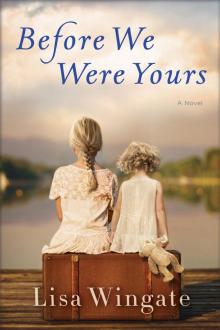 Before We Were Yours
Before We Were Yours A Sandy’s Seashell Shop Christmas
A Sandy’s Seashell Shop Christmas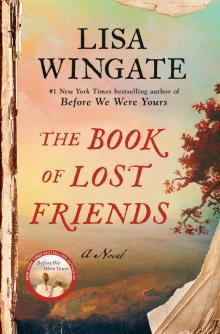 The Book of Lost Friends
The Book of Lost Friends Larkspur Cove
Larkspur Cove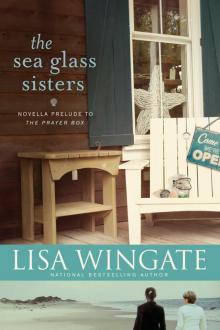 The Sea Glass Sisters
The Sea Glass Sisters The Language of Sycamores
The Language of Sycamores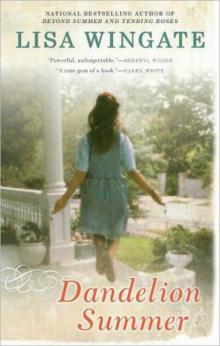 Dandelion Summer
Dandelion Summer Word Gets Around
Word Gets Around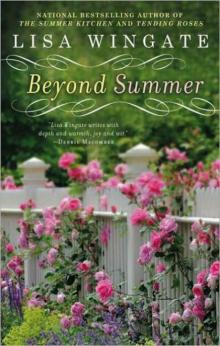 Beyond Summer
Beyond Summer Firefly Island
Firefly Island The Tidewater Sisters: Postlude to The Prayer Box
The Tidewater Sisters: Postlude to The Prayer Box Talk of the Town
Talk of the Town![Blue Sky Hill [01] A Month of Summer Read online](http://i1.bookreadfree.com/i1/03/29/blue_sky_hill_01_a_month_of_summer_preview.jpg) Blue Sky Hill [01] A Month of Summer
Blue Sky Hill [01] A Month of Summer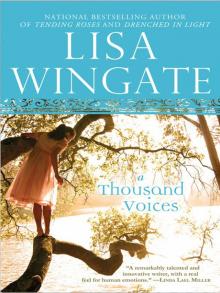 A Thousand Voices
A Thousand Voices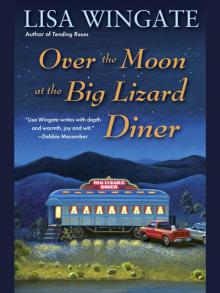 Over the Moon at the Big Lizard Diner
Over the Moon at the Big Lizard Diner Never Say Never
Never Say Never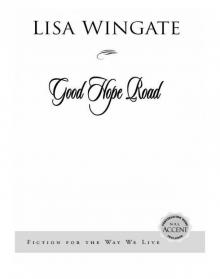 Good Hope Road
Good Hope Road The Summer Kitchen
The Summer Kitchen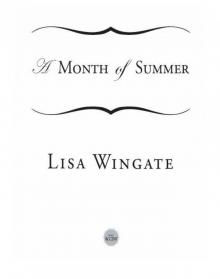 A Month of Summer
A Month of Summer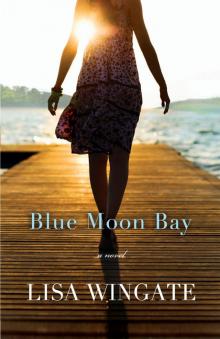 Blue Moon Bay
Blue Moon Bay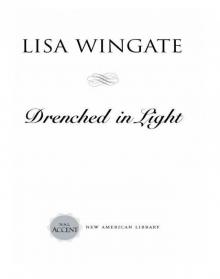 Drenched in Light
Drenched in Light The Sea Keeper's Daughters
The Sea Keeper's Daughters